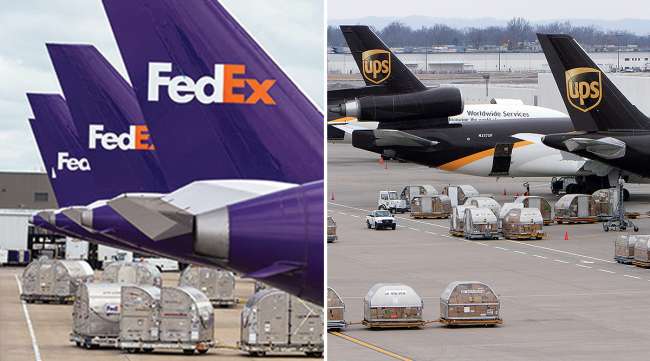Senior Reporter
FedEx, UPS Tell Senators of Vaccine Distribution Readiness

[Ensure you have all the info you need in these unprecedented times. Subscribe now.]
Two of the country’s largest freight firms reassured federal lawmakers of their preparedness in helping to deliver COVID-19 vaccines as early as this month.
At a hearing with members of the Senate Commerce Committee, officials from FedEx Express and UPS Inc. emphasized their capabilities and readiness to maneuver the logistical intricacies linked with the massive distribution of the vaccines.
On Dec. 11, the U.S. Food and Drug Administration approved the Pfizer/BioNTech vaccine and distribution began Dec. 13.
The task of deciphering challenges that would stem from transporting a COVID-19 vaccine is one which the companies said they are confident to be able to handle.
“From day one of our operation, FedEx has taken the necessary steps and is well-positioned to respond both here and abroad,” Richard Smith, regional president of the Americas and executive vice president at FedEx Express, told senators Dec. 10.
FedEx Express is a unit of Memphis, Tenn.-based FedEx Corp.
“Please understand that UPS has spent many weeks designing the supply routes and expected data flows for these vaccines. Capacity has been reserved in our air network, our operating hubs and our ground operations,” said Wesley Wheeler, UPS president of global health care. “We are ready.”
The first shipment of #COVID19 vaccine kits arrived Thursday in Louisville, Ky and across nation via @UPS. The kits were sorted at #UPSWorldport Wednesday night. They will be followed by the vaccine itself when the FDA grants emergency use authority. pic.twitter.com/sXrr7gCTgo — UPS (@UPS) December 11, 2020
Specifically, the FedEx and UPS executives confirmed the development of sophisticated tracking devices to monitor the locations and conditions of the vaccines in their possession. They also noted the development of teams charged with focusing exclusively on the vaccines’ distribution. Along those lines, they elevated the vaccine’s status as a product of the highest priority.
UPS ranks No. 1 on the Transport Topics Top 100 list of the largest for-hire carriers in North America. It ranks No. 2 on the Transport Topics Top 50 list of the largest logistics companies in North America. FedEx ranks No. 2 on the for-hire TT100 and No. 15 on the Top 50.
The freight executives also expressed confidence in the ability to deliver to rural communities nationwide, remote locations and locales with certain security or other requirements. Myriad so-called “freezer farms” as well as specialized containers are set to provide the requisite storage to preserve vaccines, the companies explained.
Logistical considerations regarding the distribution process include the refrigeration of Pfizer’s vaccine, which necessitates a temperature of minus 94 degrees Fahrenheit. Another vaccine, developed by the firm Moderna, necessitates refrigeration at minus 4 degrees Fahrenheit.
Policymakers announced a commitment to boost funding for distributing the vaccines and allocating resources for a smooth distribution campaign this winter and beyond. Negotiations continue on Capitol Hill on potentially allocating billions of dollars to be used for supporting the stability of supply chains during the pandemic.
“UPS and FedEx will play a critical role in ensuring these vaccines are delivered to providers identified by the states. States will then ensure the vaccine is either administered or redistributed as necessary,” said Sen. Deb Fischer (R-Neb.), chairwoman of the Transportation and Safety Subcommittee. She emphasized that access to the vaccines has been possible primarily through a public-private partnership established as part of the Trump administration’s pandemic response.
“I am cautiously optimistic about the outcome because of actions taken thus far by many public and private sector stakeholders to develop and implement a strategic road map needed to ensure the safe, efficient and equitable distribution of vaccines to Americans as quickly as possible,” added Sen. Tammy Duckworth (D-Ill.), the subcommittee’s ranking member.
This year, the administration assembled “Operation Warp Speed” designed to create a multiagency resource to combat the coronavirus. As President Donald Trump affirmed on Dec. 8, “Through our partnership with FedEx, UPS and McKesson, we’ll ship doses from warehouses directly to the designated sites. And we’re thrilled to be joined by representatives of those, really, great American companies. Those companies have worked with us, and they’ve been incredible to work with.”
McKesson is a health care company specializing in wholesale medical supplies and equipment, distribution and technology solutions.
To guarantee the safety of the workforce tasked with large-scale distribution, a group of freight stakeholders called on Fischer and her colleagues on the panel to ensure the timely access to the COVID-19 vaccine for their industry. Prioritizing the health and safety of the workforce overseeing the country’s trucks, railroads, ports and waterways would help to minimize potential supply chain disruptions, delays in distribution and adverse economic effects, argued the stakeholders.
In a letter Dec. 9 to Fischer, Duckworth and Commerce Committee Chairman Roger Wicker (R-Miss.) and committee ranking member Maria Cantwell (D-Wash.), the freight groups indicated, “Ensuring vaccine availability for freight, rail, port and waterway, and energy workers is a key protective intervention to help keep our critical supply chains operating, reinforce the resilience of our transportation networks, and mitigate the risk of economic downturns and their effects at the local, regional, and national levels. As we saw at the outset of the pandemic, when supply lines are disrupted, consequences are fast to follow.”
Vaccine Letter to Senators by Transport Topics on Scribd
“Our industries are proud to continue to support America’s response to and recovery from the COVID-19 pandemic,” added the groups, which included American Trucking Associations, American Association of Port Authorities, American Short Line and Regional Railroad Association, Association of American Railroads, American Waterways Operators, Inland Rivers, Ports and Terminals, Interstate Natural Gas Association of America, National Association of Waterfront Employers, National Maritime Safety Association, the National Tank Truck Carriers, and the Truckload Carriers Association.
Want more news? Listen to today's daily briefing:
Subscribe: Apple Podcasts | Spotify | Amazon Alexa | Google Assistant | More




